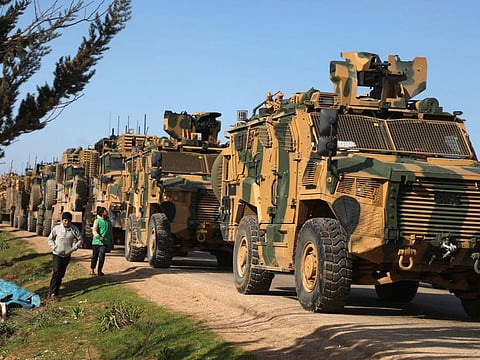World cannot afford to ignore Erdogan’s bullying
He is chasing Davutoglu’s regional objectives – with arms and mercenaries

Dubai: In his book, Erdogan’s Empire: Turkey and the Politics of the Middle East, Soner Cagaptay argues that Turkey today “faces a hostile world” due to its President Recep Tayyip Erdogan’s “imperial-style foreign policy”.
He says that policy, designed to “restore Turkey’s Ottoman-era reach into the Arabian Middle East and the Balkans”, has left the country with no friends. Furthermore, Turkey cannot rely on the unconditional support of its traditional Western allies because of its president’s policies.
Today’s Turkey is at war on two fronts: Syria and Libya. The threat of a military confrontation with Russia in Syria is real over their conflicting agendas in the Syrian civil war. In Libya, Turkey and the militias it supports are battling the Moscow-supported Libyan National Army, led by Khalifa Haftar. What drives Erdogan to wage those wars? He simply is a bully who tries to intimidate his neighbours.
It all goes back to the ideas of his one-time ally, foreign policy adviser and Prime Minister, Professor Ahmet Davutoglu who came up with the ‘neo-Ottoman’ idea that envisaged a greater role for Turkey in the Middle East, which the Ottoman Empire once ruled, and the world.
'Zero problems with neighbours'
Davutoglu explained his grand scheme in his book, Strategic Depth. Erdogan liked the book so much he hired its author as foreign policy adviser in 2002. Davutoglu proposed a pro-active foreign policy with “zero problems with the neighbours”. He wanted Turkey to play an influential role based on cooperation with regional powers, but from a point of strength. He argued that his country could leverage that regional role in its relationship with the rest of the world. He wanted to do it smartly. By using its “geopolitical and geostrategic position”, Turkey can become a key regional as well as international player. He advocated ending decades-old problems with Turkey’s neighbours, such as Syria, Iran, and Egypt. However, he still wanted a good relationship with the West, particularly Nato.
Erdogan, meanwhile, sought a more confrontational strategy for the same objectives. His personal political style - the autocratic one man show - cast heavy shadow on Turkey’s endeavours to realise that much-sought dream. Davutoglu replaced Erdogan as Prime Minister in 2014, but resigned after only 20 months in office amid increasing differences between the president and his premier over the former’s plans to tighten his grip on power and his seemingly individualistic governing style.
Davutoglu stepped down but his ideas remain the guiding principles for Erdogan, who thought he could bully his way into achieving the Ottoman dream.
When the so-called Arab Spring began in early 2011, Erdogan, given his strong ties to the Muslim Brotherhood, saw the protests in the Arab world as a chance to advance the Brotherhood case in the region, under which he could emerge as the ultimate powerbroker. When the Brotherhood’s leader Mohammad Mursi took power in Egypt following the overthrow of Hosni Mubarak, the Turkish president was welcomed as a ‘hero of the revolution’ in Cairo. But when Mursi was ousted by mass protests in 2013, Erdogan saw it as a hostile move that placed Egypt on the top of his ‘enemy-list’.
Pro-Brotherhood
In Syria, he supported the mostly Islamist rebels with arms, training camps in Turkey and safe routes between his country and Syria. Istanbul is still today the de-facto headquarters of the Syrian pro-Brotherhood opposition.
And more recently in Libya, as the LNA moved to oust the rule of Islamist militia-backed government of Fayez Al Sarraj in Tripoli, Erdogan entered the scene quickly with his own Syrian militia and heavy weapons to support the embattled Al Sarraj. While Davutoglu proposed a greater role for Turkey with a more subtle foreign policy, Erdogan is chasing the same objective with arms and mercenaries. As he bullies his way around the region, the rest of the world is seemingly unable to comprehend what he wants.
Intimidating Europe
Another bullying tactic is his use of Syrian refugees (there more than 3 million of them inside Turkey) to intimidate Europe into agreeing with him to stop the Syrian army, supported by the Russians, from overrunning the last enclave of the opposition in the northwestern Idlib province. He threatens to ‘drown’ Europe with Syrian refugees by opening the until recently controlled borders with Turkey’s European neighbours.
As Turkey’s list of adversaries grows, so does Erdogan’s hostile foreign policy. His tactics have become a real threat to not only stability and peace in the Middle East but to the entire world. The US seems to be tolerating his adventurism so far. But that should stop. Someone must stand up to Erdogan’s bullying.







